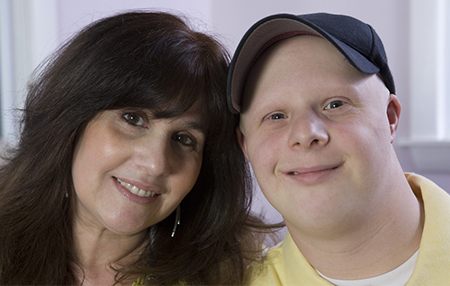Supported Decision-Making
 What is Supported Decision-Making?
What is Supported Decision-Making?
Supported decision-making (SDM) is a promising alternative to guardianship for individuals with an intellectual or development disability. Supported decision-making allows an individual with a disability to make his or her own decisions about life choices with the support of a designated person or team of trusted supporters. SDM is grounded in the belief that all people, regardless of their disability, have a right to exercise choice in all aspects of their lives. SDM can also be helpful to people with dementia and mental health diagnoses.
How does SDM work?
People with disabilities may need assistance making decisions about living arrangements, health care, lifestyles and financial matters, but they don’t necessarily need a guardian to make those decisions for them. Instead, what they might need is a trusted group of “supporters” to help answer their questions and discuss their options so they can make their own decisions. Supporters can be anyone the person trusts: family members, co-workers, friends, past or present service providers. It is critically important that supporters know and respect the person’s preferences, and are committed to honoring the choices and decisions the individual makes. The individual and the supporters sign a SDM Agreement.
What’s the SDM Agreement?
Under the SDM model, an individual with a disability identifies areas where he or she needs decision-making help, like budgeting, health care, living arrangements, relationships or jobs, and then chooses supporters to provide that help. The individual chooses supporters in each area- a person can choose one or two supporters or a team of supporters. The individual and his/her supporters sign an Agreement, which can be notarized. Whenever the individual is faced with a decision, he or she confers with supporters, reviews the pros and cons, and then makes his or her own decision.
What’s the difference between SDM and guardianship?
SDM promotes self-determination, control and autonomy. It fosters independence. Unlike substituted decision-making where guardians make decisions for the individual, supported decision-making enables the person to make his or her own decisions with assistance from a trusted network of supporters.
Do we have a SDM Project in Massachusetts?
In Massachusetts, the Center for Public Representation (CPR), a nonprofit law firm focusing on disability rights in Massachusetts and across the country, and Nonotuck Resource Associates, Inc. (Nonotuck), a service provider principally of shared living and adult family care residential supports, partnered to offer adults with intellectual and/or developmental disabilities living in western Massachusetts an opportunity to use Supported Decision Making (SDM)
The CPR-Nonotuck Supported Decision-Making Pilot Project is one of the first demonstrations in the nation. Project staff worked together to help participants and their support networks develop and execute their SDM Agreements. Now in its third year, CPR’s SDM demonstration project is a success: All participants report that as a direct result of SDM, they are more confident, more independent and more confident about expressing their opinions. You can read more about the project and meet some of the participants, here.
You can download a brochure here.
For more information contact: Michael Kendrick, Center for Public Representation, 22 Green St., Northampton, MA 01060.
Visit the Center for Public Representation (CPR) website : https://centerforpublicrep.org/initiative/supported-decision-making/
Information about efforts around the nation is available at http://www.supporteddecisionmaking.org
We want to thank Robert Fleischner, Esq., for shinning a light on this promising alternative to explore with our families, care professionals and community members. Let us know what you think. Send your comments to Ellen @ edipaola@honoringchociesmass.com
Information about supported decision-making is re-printed here with permission from the Center for Public Representation.
